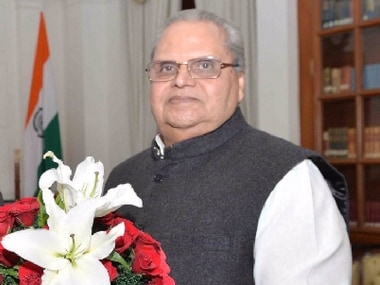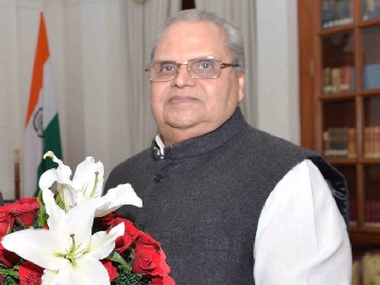Jammu and Kashmir governor Satya Pal Malik ’s decision to dissolve the state Assembly was not an abrupt one. It had been under active consideration of Raj Bhawan in Srinagar, the home ministry and the prime minister’s office (PMO) for quite some time. What held them back from issuing such a proclamation till the evening of 21 November was an important legal and constitutional point — that the elections must be held within six months of the dissolution of the Assembly. Keeping this in consideration, if the Assembly had been dissolved a month or a fortnight ago, the election process in the state would have had to be completed slightly ahead of the parliamentary elections. In such a scenario, two election processes would have been held in the state within a month. That situation had to be avoided. If the Assembly election had been scheduled even for a few days beyond six months, it would have invited a whole lot of legal complications, and the Election Commission would have had to provide a justification. This was in no way a desirable option. It is now clear that Assembly elections in Jammu and Kashmir will be held along with the Lok Sabha election, and both the processes will be completed by 21 May, 2019. The BJP thinks that this will help its prospects in the state, and will also have its positives in terms of government expenses and security preparedness. What prompted the governor to dissolve the Assembly on Wednesday, which was a holiday? Malik said that for the past fifteen days, he had been receiving intelligence that some MLAs were being intimidated, some were being offered huge sums of money, and some others were being threatened by terror outfits. According to him, a government formed through such means could not have lasted. He added that Mehbooba Mufti herself had complained that her MLAs were being intimidated and threatened, and other leaders had also made similar claims. The PDP leader’s biggest worry till recently was preventing her flock from splitting. Malik’s argument, therefore, was that he decided not to entertain the claims of either Mufti or Sajjad Lone . [caption id=“attachment_5332231” align=“alignleft” width=“380”]  File image of Jammu and Kashmir governor Satya Pal Malik. Twitter/@rashtrapatibhvn[/caption] The statement made by the governor, in which he termed the coming together of the PDP, National Conference and Congress as an “unholy alliance”, is a debatable one. However, it is not his business to decide whether an alliance of mainstream political parties in the state is “holy” or “unholy”. The special status of Jammu and Kashmir gave the governor powers to dissolve the Assembly without making any formal consultations, or without sending any official report to the Centre. Two days ago, Malik had met Prime Minister Narendra Modi in New Delhi, and the decision was apparently taken. It was then a matter of time. Sources said that the political leadership in the central government did not want to lose the gains that had been made in the past few months, particularly on the security front, by allowing the formation of an inherently unstable government. The successful completion of two phases of the nine-phase panchayat election had given the BJP leadership at the Centre hope that democratic processes were being strengthened. While some candidates in the Valley were elected unopposed, in most panchayats, several candidates had contested the polls. The total number of candidates for all nine phases of the election runs into thousands, and the voter turnout has also been good. The security forces and state election commission ensured that elections were fair and peaceful. The decision of the PDP and NC not to participate in the elections had a significant political meaning. While some would argue that the boycott sent out a message that the local body election was not fully democratic, this situation provided a great opportunity for the BJP to expand its base in the Valley. It also gave opportunities to a new crop of leaders, which may not otherwise have happened. The recently elected people’s representatives now have substantial powers and influence, through which they can ensure the delivery of public services. The panchayat and local body elections in Jammu and Kashmir will end on 11 December. While the political inclinations of the new leaders cannot be predicted at this stage, it is expected that they would bring in a new thought process, which, in due course, can change the political dynamics in the entire state, including the Valley. While the PDP and NC had decided to boycott the local body polls, the unfolding situation would not be a happy one for either of them. This partially explains why the PDP and NC buried their bitter rivalry and decided to join hands for now, though Omar Abdullah on Thursday said his decision to support the PDP was only tactical. While he had reiterated his oral support to the PDP’s aborted move to form the government, he made it clear that the NC would fight elections against the PDP, Congress and BJP, as had happened before. Abdullah has also spoken in favour of simultaneous polls. The state will be in election mode from now till mid-May, when the state and parliamentary polls will be completed. There are clear indications that most parties, including the PDP and NC, were relieved by the governor’s decision to dissolve the Assembly. However, the way it was done has given them a handle to challenge the Centre. The issue is certain to be a topic of intense discussion during the Winter Session of Parliament, when the decision to impose President’s Rule comes up for ratification.
Satya Pal Malik said that for the past 15 days, he had been receiving intelligence that some MLAs were being intimidated, and some were being offered huge sums of money.
Advertisement
End of Article


)
)
)
)
)
)
)
)
)



